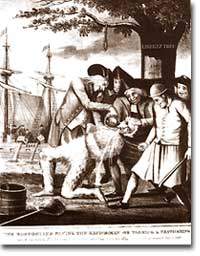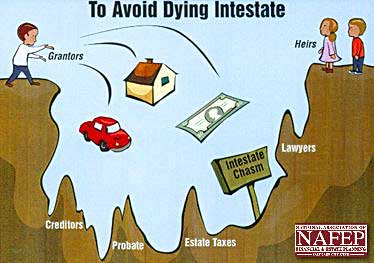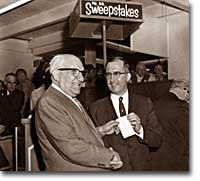How Do Local Governments Pay For The Services They Provide

12b. Financing Land and Local Authorities

Completed in 2007, Boston'due south Primal Artery/Tunnel Project — a.k.a. the "Large Dig" — was the largest, about complex, and most technologically challenging highway project in the U.S. Financing came from a combination of federal, state, and local funds.
Paying taxes is surely everyone's least favorite government-related activity. But taxing citizens is i of the concurrent powers of regime. Federal, state, and local levels all accept the power to tax.
Of class, people look state and local governments to provide services such as police force protection, education, highway building and maintenance, welfare programs, and hospital and health care. Taxes are a major source of income to pay for these services and many others that hit close to abode. For almost people, their local and state tax money pays for very visible services that they generally accept for granted, except when something goes wrong with garbage collection, traffic lights, or snow removal. People are most likely to get involved with local and state governments when these basic services go incorrect.
Expenses
The single biggest expenditure in all states is education, with the average state and the localities within it spending just less than one-quarter of its budget for public schools. Funding for education comes primarily from the local school district budget, simply nearly land governments give a great deal of financial and administrative support to schools. Other large upkeep items for land and local governments are the following:
- Public welfare
- Health intendance
- Highways
- Constabulary and burn protection
- Involvement on debt
- Utilities and liquor stores

What would you practice if there was a tax that didn't provide for the bones needs and services of your local area, and instead went to some monarch on another continent? Early American colonists had an answer. This cartoon from 1774 reads: "The Bostonians paying the excise-man or tarring and feathering."
Each of these items is less than x% of country and local expenditures in most states, only together they make upward a skilful portion of the expenses.

Income
Counties, townships, cities, and states collect some of their money from licenses and fees and state-operated businesses, merely well-nigh one-half of country revenue comes from taxes. Ii other sources of income are grants from the federal authorities and, in some states, lotteries. Most states and localities levy three types of taxes:
- Sales taxes are the most important source of revenue for states. It is placed on various products, and customers pay the tax when they buy them. Today 45 states have a general sales tax that applies to well-nigh goods, although food is usually excluded, and sometimes wearable is exempt. Some cities also collect sales taxation.
- Income taxes are imposed by all but a handful of states on personal and corporate incomes. Personal income taxes are generally progressive; that is, they are graduated so that the charge per unit goes upwards with the size of the income. States generally do not allow local governments to levy income taxes, just some municipalities impose a payroll tax on people that piece of work within their borders.
- Holding taxes provide the chief source of income for local governments today. Taxes are levied on land, buildings, and personal dwellings. Belongings must be assessed for its value, and about cities employ taxation assessors for that job. Property taxes are controversial because other types of property, such every bit stocks, bonds, and bank accounts, by and large are not taxed. Those who hold "real" property, then, pay a disproportionate share of the taxes.

You've heard about "decease and taxes" but this is a double whammy: if a person dies "intestate" — without having created a will or trust for his or her heirs — both federal and state governments are poised to take a hefty chunk of that person's estate by imposing inheritance and estate taxes.
Other taxes include inheritance and manor taxes imposed when a person dies and wills property to heirs. Several states have severance taxes, levied on those that extract natural resources such equally coal, oil, timber, and gas from the state. Virtually all states place special excise taxes on gasoline, liquor, automobiles, and cigarettes.
Most states get more than a quarter of their income from federal grants that unremarkably come with restrictions as to how the coin tin can be used. Federal grants often go for edifice projects, such every bit roads, bridges, and dams, and for education, wellness care, and welfare.

In 1964, the New Hampshire Legislature created the first legal state lottery of the 20th century. Hither, the first ticket is sold to Governor John Due west. King.
In recent years more and more states accept turned to lotteries to pay their expenses. Billions of dollars now come up from lotteries, with states retaining nearly one-3rd of the money as proceeds. Some states designate that the money be spent on something special, such equally education, the arts, or building projects. Lotteries are controversial considering some people believe that lotteries hurt lower-income people, who buy about of the tickets.
Taxes, federal grants, fees, licenses, and lotteries back up state and local budgets. Near people understand more than virtually where their state and local taxes and fees go than they do about federal expenditures. Perhaps that is considering country and local services tend to affect their personal lives more straight. Still, many complain that they practise non get their money'south worth. It is always easier to recognize the pinch that taxes bring than the services most people have for granted.
How Do Local Governments Pay For The Services They Provide,
Source: https://www.ushistory.org/gov/12b.asp
Posted by: spencerbourre.blogspot.com


0 Response to "How Do Local Governments Pay For The Services They Provide"
Post a Comment